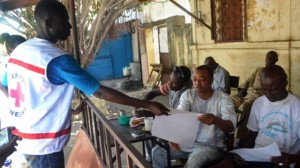 Washington (AFP) – The number of Ebola infections in Liberia and Sierra Leone could skyrocket to 1.4 million by January 2015, according to a worst-case scenario released by US health authorities Tuesday.
Washington (AFP) – The number of Ebola infections in Liberia and Sierra Leone could skyrocket to 1.4 million by January 2015, according to a worst-case scenario released by US health authorities Tuesday.
The US Centers for Disease Control and Prevention estimated that Ebola cases in these two West African nations could range between 550,000 and 1.4 million cases by January 20, 2015.
The Ebola epidemic has killed 2,811 people of the 5,864 infected since the beginning of the year in Sierra Leone, Guinea, Liberia and Nigeria, according to the World Health Organization.
The CDC estimate is based on the assumption that Ebola cases in the world’s largest outbreak to date are being underreported by a factor of 2.5.
However, experts warned the figures are based on data that is three weeks old, before the United States and other nations ramped up their responses to the epidemic in West Africa.
“The numbers do not reflect current conditions,” said a CDC statement on the projection, published in the agency’s Morbidity and Mortality Weekly Report.
Asked by reporters why the CDC would release information that was already out of date, the agency’s chief Tom Frieden said the model is designed to be used by government leaders and international relief groups to model what may happen under different variables.
“The bottom line here — and what I think what is really important in this tool — is that the model shows that a surge now can break the back of the epidemic,” Frieden said.
“It also shows that there are severe costs of delay.”
The UN health agency earlier Tuesday projected that new cases would increase from hundreds each week to thousands without “drastic improvements in control measures,” with infections more than tripling to 20,000 by November.
That study, published in the New England Journal of Medicine, projected a 46 percent death rate among reported cases that have a known clinical outcome.
Some prior outbreaks of Ebola have had much higher fatality rates.
A key challenge in the current epidemic is isolating and treating those who are sick.
A US military mission to the region has begun, which will involve 3,000 troops providing training and logistics.
In Liberia, the hardest-hit nation, chronic shortages of beds and staff have forced health care workers to turn patients away.
“I would say that we have seen a tremendous surge in the last week in responses from around the world,” said Gayle Smith, special assistant to the president and senior director of the National Security Council.
“That momentum must be at least maintained so that we can assure that we are way out ahead of this and not assuming… that we don’t need more.”
Ebola is spread through close contact with the bodily fluids of an infected person, or by touching the corpse of someone who died from the disease — as is a common custom in funeral rites.
The hemorrhagic fever causes muscle aches, diarrhea and vomiting.
“If we move fast enough we can turn it around,” said Frieden.
“I am confident that the most dire projections are not going to come to pass.”
